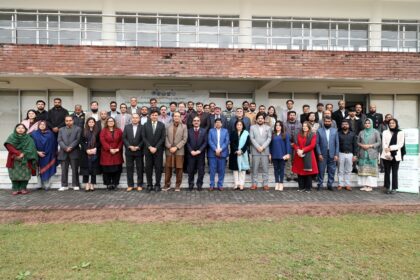Pakistan has launched its first nationwide Human Papillomavirus (HPV) vaccination campaign to protect an estimated 13 million girls aged 9–14 from cervical cancer. The drive, led by the Federal Directorate of Immunization in partnership with the World Health Organization, Gavi and UNICEF, will mobilize more than 49,000 WHO-trained health workers and aims to vaccinate at least 90% of eligible girls in its initial phase while integrating the vaccine into routine immunization for younger children in later years.
The launch ceremony was presided over by Federal Health Minister Syed Mustafa Kamal, joined by WHO Representative Dr. Dapeng Luo and other partners. Minister Kamal urged parents to have their daughters vaccinated, stressing that the vaccine is safe and essential and warning against misinformation and negative campaigns that could undermine uptake.
Campaign operations will take place at fixed health centers, outreach sites, schools, and through mobile and special vaccination teams. Outreach sites will be established in remote areas, and special teams will be sent to reach high-risk and underserved populations. The HPV vaccine will be provided free of charge to all eligible girls in the targeted areas, which in the first phase include Punjab, Sindh, Pakistan-administered Kashmir and the Islamabad Capital Territory. Authorities plan phased expansion to other provinces and regions in subsequent rounds.
WHO Representative Dr. Dapeng Luo highlighted the public health urgency, noting that Pakistan loses multiple women to cervical cancer every day. He described the WHO-prequalified HPV vaccine as a safe, science-based intervention with a long record of saving lives in more than 150 countries and stressed that introducing the vaccine is an investment in the health of girls, their future families, and the nation.
Gavi’s Chief Country Delivery Officer Thabani Maphosa emphasized the vaccine’s impact, noting that a single dose can prevent most cases of cervical cancer and pointing to the global burden of the disease. He praised Pakistan’s leadership and partners for the opportunity to transform women’s health and give millions of girls the chance to pursue their futures without the threat of cervical cancer.
UNICEF Representative Pernille Ironside called the campaign a historic step for girls and young women in Pakistan, saying the vaccine can protect future generations from a preventable and life‑threatening disease and enable girls to grow, learn and thrive.
WHO and its partners say they will continue to support Pakistan’s efforts to expand coverage and work toward the global goal of eliminating cervical cancer as a public health problem.











